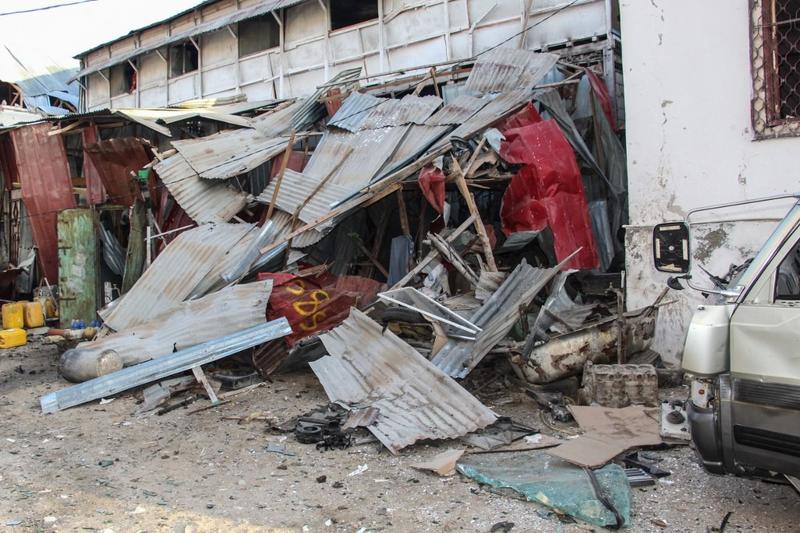 Debris remain at the blast site from a suicide car bombing attack from the day before at the side of Afrik Hotel in Mogadishu, Somalia, on Feb 1, 2021. At least three people including two civilians were killed in a jihadist attack on Jan 31, 2021 on a Mogadishu hotel, a Somali security source said. (STRINGER / AFP)
Debris remain at the blast site from a suicide car bombing attack from the day before at the side of Afrik Hotel in Mogadishu, Somalia, on Feb 1, 2021. At least three people including two civilians were killed in a jihadist attack on Jan 31, 2021 on a Mogadishu hotel, a Somali security source said. (STRINGER / AFP)
Suicide bombers struck in a crowded Baghdad market in mid-January, killing more than 30 people and wounding around 100 others. The month closed with militants storming a hotel in the Somali capital Mogadishu, with the loss of nine lives in an ensuing siege.
The two attacks are seen as examples of a worrying trend: the terrorist groups once seen as on the backfoot are staging comebacks in the Middle East and parts of Africa.
Somalia has long been plagued by Islamist militants. Al-Shabab, which is fighting to overthrow the internationally backed government, claimed responsibility for the Mogadishu attack on Jan 31.
The UN experts said that the threat continued to rise in conflict zones in the last half of 2020 because "the pandemic inhibited forces of law and order more than terrorists" who were able to move and gather freely despite COVID-19 restrictions
A day after the Jan 21 attack on the market in the Iraqi capital's Bab al-Sharji area, the Islamic State group claimed responsibility. That day, Iraqi Prime Minister Mustafa al-Kadhimi pledged that the security breach that enabled the twin suicide bombings in Baghdad "would not be repeated".
Yet, security experts believe the threat from terrorism is on the rise not only in Iraq but in neighboring Syria and Afghanistan, among other conflict-ridden countries in the region. What's worse, the pandemic may have become a fresh driving factor in the terrorists' resurgence.
In a report to the United Nations Security Council circulated on Thursday, a panel of experts said the virus has increased the threat from the IS and al-Qaida extremist groups in conflict areas including Afghanistan, Syria and Iraq.
ALSO READ: Bomb blast kills deputy governor of Afghanistan's capital
The UN experts said that the threat continued to rise in conflict zones in the last half of 2020 because "the pandemic inhibited forces of law and order more than terrorists" who were able to move and gather freely despite COVID-19 restrictions.
Source of concern
Iraq and Syria remain "the core area" for the Islamic State group, and Syria's northwest Idlib region where al-Qaida has affiliates is "a source of concern", the panel added.
Su Xiaohui, a senior researcher of international strategies at the China Institute of International Studies, said the latest attack was "not an isolated incident", reflecting the fact that anti-terrorism risks faced by Iraq are "gradually increasing".
"Besides Iraq, more of its neighboring countries are also confronting such risks of terrorist attacks," Su said. "It has become a trend."
The coronavirus pandemic has not only affected Iraq's economy, but also its security issues, such as the frequency of security forces' patrols, Su said.
For Baghdad residents, the twin bombings last month took them back to the bad old days. Suicide attacks, once an almost daily occurrence in the Iraqi capital, have become rare in the city, especially after security was improved following the defeat of the IS militants.
However, sporadic deadly incidents still occur in the war-ravaged country as IS remnants have since melted into urban areas or deserts and rugged areas, carrying out frequent guerrilla attacks against security forces and civilians, experts said.
For some observers, there were early signs of the resurgence of extremist groups.
On Jan 15, 2018, two suicide bombings took place at Baghdad's al-Tayaran Square-the site of the market attack last month. Thirty-six people were killed.
In the second half of 2020, a number of kidnappings and bombings against civilians occurred in northern Iraq, and the patrols and outposts of the Iraqi army and police were also frequently attacked.
The environment in which terrorism breeds in the Middle East has not fundamentally changed, said Zou Zhiqiang, a researcher at Shanghai International Studies University's Middle East Studies Institute.
READ MORE: At least 30 killed, 24 hurt in E. Afghanistan suicide car bombing
Considering the complex situation in the region, Zou said the prospect of new terrorist groups emerging could not be ruled out.


